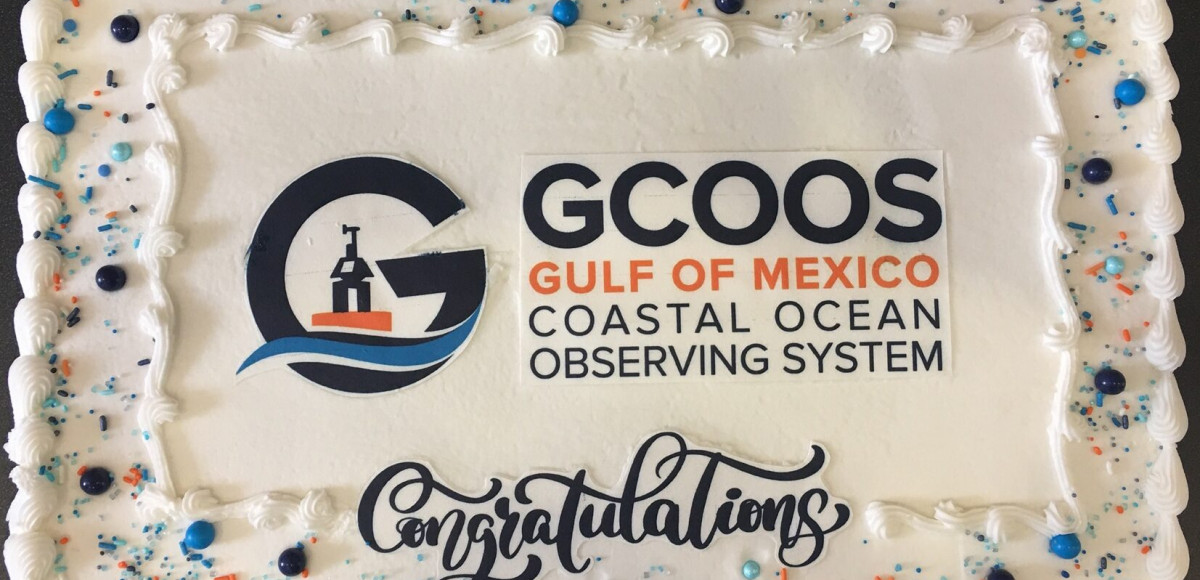
GCOOS Spring Meeting focuses on potential data streams from renewable energy and uncrewed platforms and new data coming in about the Gulf of Mexico
The Spring Members’ Meeting of the Gulf of Mexico Coastal Ocean Observing System (GCOOS) included discussions of data collection and dissemination from renewable energy platforms and new and up-and-coming uncrewed systems, as well as the latest information from the large-scale effort to better understand the Gulf’s Loop Current System.
GCOOS is the Gulf of Mexico regional component of the U.S. Integrated Ocean Observing System (IOOS) — a network of people and technology gathering coastal and ocean data and developing predictive tools about the ocean. It’s the only NOAA-certified system dedicated solely to the Gulf of Mexico providing on-demand information about the Gulf’s coastal and open ocean waters that is accurate, reliable and benefits people, ecosystems and the economy. GCOOS members come from government, academia and industry, and meet twice a year to share information and the latest efforts in ocean observing in the Gulf.
“As an organization, one of our roles is to help develop and support relationships among the research, academic, governmental and business sectors,” said GCOOS Board Chair Kirsten Larsen. “These meetings allow us an opportunity to not only share the latest advancements in technology and data collection and dissemination, but to continue developing important alliances that support the Gulf’s economy and benefit its communities.”
The April 18 meeting, held at the University of Southern Mississippi’s Gulf Park Campus in Gulfport, included a welcome from Dr. Leila Hamdan, USM Associate Vice President for Research and Coastal Operations, an announcement of the winners of the annual GCOOS Board of Directors election, and updates from Kristen Yarincik, Director of the IOOS Association (presentation link), and Carl Gouldman, Director of the U.S. IOOS program office (presentation link), who also announced the recertification of GCOOS.
Recertification
Recertification means that GCOOS continues to meet the gold standard for data gathering and management and operates inclusively, transparently and seeks user input to determine system priorities. GCOOS is one of 11 Regional Coastal Observing Systems (RCOS), which operate across the U.S. and have implemented specific data collection and management practices, including following a thorough vetting and documentation process. Recertification means that GCOOS data continues to hold the same quality assurance as data coming from federal agencies.
“Certification is a sign of excellence in data management and governance,” said Carl Gouldman, U.S. IOOS Director. “Recertification means that GCOOS continues to maintain those high standards to provide high quality, reliable data, and that IOOS and NOAA stand behind GCOOS’s operational standards.”
Operational standards — especially related to new and emerging industries and ocean energy platforms — was a key discussion point during the meeting.
“As our recertification shows, we’re dedicated to ensuring the integrity of data that we collect from our partners and principal investigators and share throughout the Gulf,” said GCOOS Executive Director Dr. Jorge Brenner. “It’s especially important that as new platforms come on-line, we’re ready and able to ensure this same measure of quality control.”
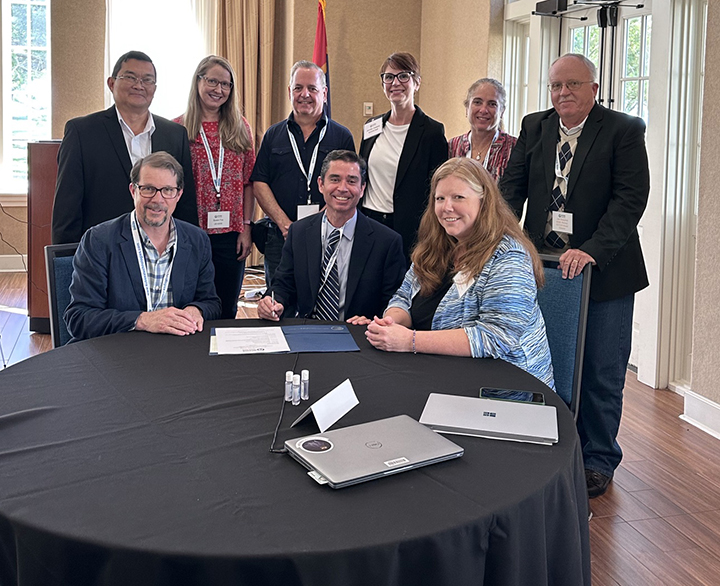
Recertification: Carl Gouldman, Director of U.S. the IOOS program office (seated, left); Dr. Jorge Brenner, GCOOS Executive Director (seated, center); and GCOOS Board Chair Kirsten Larsen (seated, right) sign the recertification memorandum of understanding. Back row (L to R) GCOOS co-Data Manager and Systems Architect Felimon Gayanilo; Susan Fox, IOOS Regional Coordinator; GCOOS co-Data Manager and Product Developer Bob Currier; GCOOS Research Associate Jennifer Vreeland-Dawson; GCOOS Outreach & Education Manager Dr. Chris Simoniello; and GCOOS Board Member and Immediate Past Chair Joe Swaykos.
Panel Discussions
“Offshore Wind Renewable Energy and Data in the Gulf of Mexico,” moderated by Sharon Mesick, Regional Climate Services Director, Southern Region, NCEI, NOAA. Speakers were:
- Dr. Gerhard Kuska, Executive Director of the Mid-Atlantic Regional Association Coastal Ocean Observing System (MARACOOS), who outlined MARACOOS experiences in collaborating with the wind energy community in the Atlantic and the need to develop cooperation agreements early (presentation link);
- Dr. Jim Kendall, Regional Director of the Bureau of Ocean Energy Management (BOEM), who provided an overview and timeline of the development of the wind energy industry in the Gulf of Mexico, the need to manage multiple uses (e.g., fisheries, oil and gas, military, transportation and marine animals/habitats) along with the needs for dynamic modeling to support the industry; and
- Dr. Rafael Ramos, Regional Manager and Senior Oceanographer, Woods Hole Group, who talked about potential strategies for data collection and standardization, including some ideas for how GCOOS can support the renewable energy community in the Gulf (presentation link).
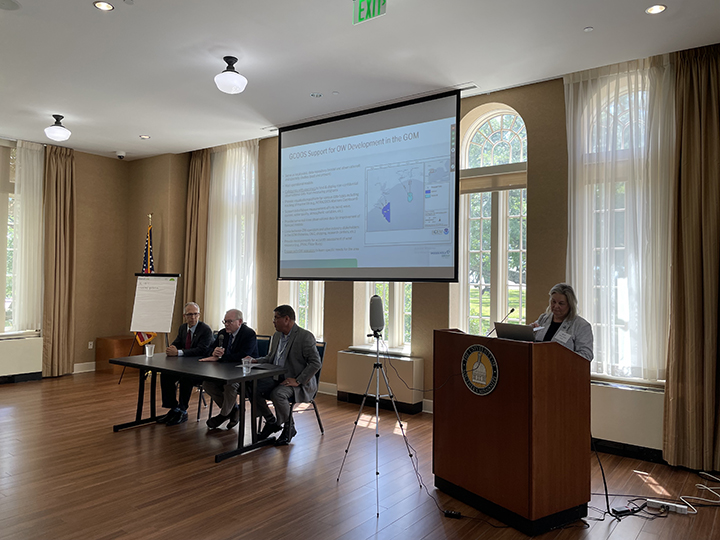
Seated left to right, panelists Kuska, Kendall and Ramos with moderator Mesick standing at the podium.
“Understanding the Gulf Ocean Systems Project (UGOS) and the Gulf Research Program (GRP) of the National Academies of Science, Engineering & Medicine” moderated by Dr. Rafael Ramos. This GRP initiative is focused on improving the skill of sustained continuous operational forecasts and the associated physical understanding of ocean dynamics to reduce risks in offshore energy exploration and production where deep-water drilling and production occur and/or are anticipated. Speakers were:
- Michael Feldman, Senior Program Officer, GRP, who provided an overview and history of UGOS and a preview for what’s coming in the next five years (Feldmen-Glenn presentation link);
- Dr. Tony Knap, Director of Texas A&M University’s Geochemical and Environmental Research Group (TAMU-GERG), who discussed engaging stakeholders and end-users to build connections and define services that can benefit from the data collected during UGOS;
- Dr. Scott Glenn, Rutgers School of Environmental and Biological Sciences, provided an update on how some UGOS data and models are being utilized for hurricane forecasting, along with data gaps that remain (Feldmen-Glenn presentation link);
- And Dr. Steve DiMarco, TAMU-GERG, covered MASTR—a mini-adaptive sampling test run aimed at integrating and centralizing efforts across all six UGOS working groups to gather critical input on lessons learned and best practices.
“Uncrewed Systems (UxS) Opportunities in the Gulf of Mexico,” moderated by Bill Lingsch, U.S. Underwater Glider User Group (UG2) Coordinator, NOAA. Speakers were:
- Bob Currier, Co-Data Manager and Product Developer, GCOOS, discussed how the GCOOS glider piloting dashboard, GANDALF, now includes data from multiple types of uncrewed systems and floats and how to ensure that the data that GANDALF serves remains compliant with IOOS standards (presentation link);
- Andy Ziegweid, VP of Ocean Data, Ocean Aero, who discussed their examples of their vehicle uses, and the need for deeper-diving systems and new sensor packages;
- Dr. Dick Crout, Head of Ocean Sensing and Processes Branch, Naval Research Laboratory, who discussed autonomous vehicle data assimilation needs, new bioluminescent (BL) and bathyphotometer (UBAT) sensors and their value, along with the benefits and drawbacks of uncrewed systems (presentation link); and
- Dexter Malley, Head of Uncrewed Marine Systems Division, Office of Marine and Aviation Operations, NOAA, who provided an overview of how NOAA implements uncrewed underwater systems from their Gulfport base, along with how uncrewed aerial systems are used;
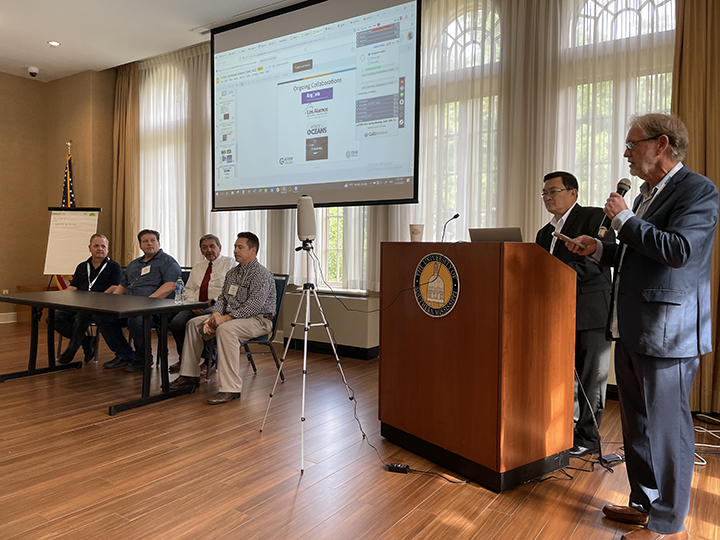
Seated left to right panelists Currier, Ziegweid, Crout and Malley with moderator Lingsch holding the microphone. (GCOOS co-Data Manager Felimon Gayanilo providing technical support at the podium.)
Board Elections
The GCOOS Board of Directors are involved in helping to chart the course for GCOOS and supporting ocean observing opportunities across the five Gulf states, along with international efforts throughout the wider Gulf of Mexico. Board members help to steer the GCOOS ship by setting organizational policies and providing direction to the executive director. Board members are elected from the private, governmental, academic and outreach and education sectors.
Directors Elected were:
Private Sector
- David Driver, BP (Ret.)
Government Sector
- Kirsten Larsen, NOAA/NCEI
- Dr. Kimberly Yates, USGS
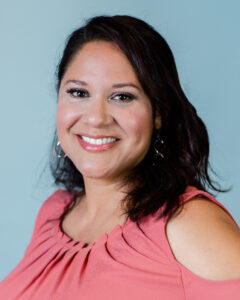
Nañez-James
Academic Sector
- Dr. Antonietta Quigg, TAMU-Galveston
Outreach & Education Sector
- Dr. Sara Graves, University of Alabama, Huntsville
- Joe Swaykos, NOAA/NDBC (Capt., Ret.)
- Dr. Suraida Eve Nañez-James, CEO/Founder of the Gulf Reach Institute and a contractor with NOAA Ocean Exploration













